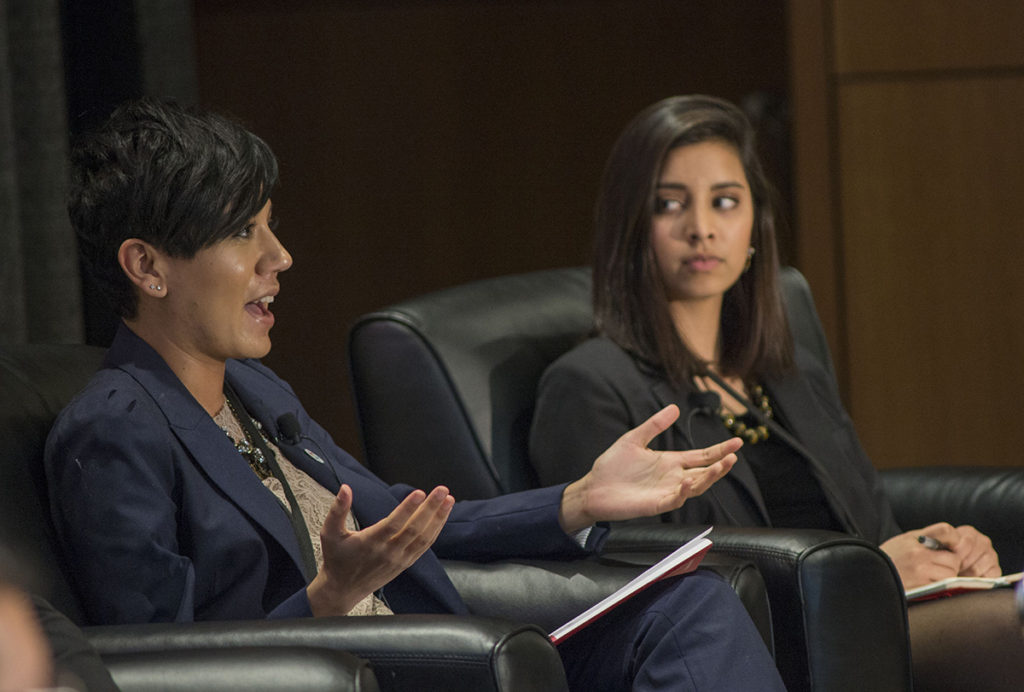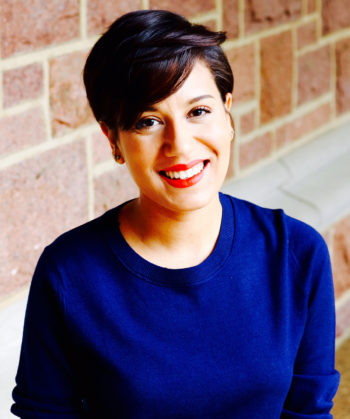Ashley Macrander to be the first graduate student to speak at Commencement

Ashley Macrander, left, participated in the A Day of Discovery & Dialogue event in February 2015. In her research, she has studied inequality in higher education both here and abroad. Joe Angeles/WUSTL Photos
There could be no student more committed to the graduate school experience at Washington University than Ashley Macrander, the first graduate student to speak at Commencement.
She has served as the graduate student leadership fellow, the co-president of the Graduate Student Senate, the graduate student representative to the Board of Trustees and a member of the executive committee of the Graduate Council of the Faculty of Arts & Sciences.
But when preparing her speech, Macrander chose not to focus on her own experiences, but those of her peers.
“I thought it was important, as the first graduate school student speaker, to put the spotlight on the amazing things graduate students are doing,” said Macrander. “So I interviewed graduate students, faculty, staff and undergraduate students about what graduate education at Washington University means to them. The stories I heard absolutely amazed me.”
Macrander will receive her PhD in Education in Arts & Sciences. After graduation, she will continue her work with graduate students as the assistant dean for graduate student affairs at the Graduate School.
“Every student should have the opportunity to meet students from different cultures, different countries and who have different approaches to research,” said Macrander. “Exposure to difference and recognizing it as a valuable part of the university experience is something no one should miss out on.”
On the eve of Washington University’s 155th Commencement, Macrander shares her goals for graduate education and shares the personal significance of this year’s speaker.
What will your goals be in your role as assistant dean?
I think more and more students are coming to graduate school and I think they are looking for some of the same types of experiences they had as an undergraduate. They come here for the amazing faculty or outstanding research opportunities, but our students also want a community that supports them and where they feel like they can be just as involved as they were at the undergraduate level. I will always say that getting an advanced degree is one of the most difficult and rewarding things we will do in our lives and I don’t think anyone can understand that experience like our peers. The bond that we share is unique and special and I want to strengthen those ties.
What was your community experience here?
Truthfully I don’t know that I would have made it without the community of peers that I have. I’m a student of color from a non-elite educational background and when I got here I had serious imposter syndrome. I wasn’t sure I would fit in or excel. But the relationships I’ve built have made it possible. My advisor, Dean William Tate, was the first person at this university who believed in me. And all of the people I’ve met in my classes and student groups have been so important. I participated for the leadership opportunities but I really stayed for the friends.

Macrander is the first graduate student to speak at Commencement. She will receive her PhD in education.
You are the first graduate student to deliver a Commencement address. How did you learn that you were selected?
That’s actually the beginning of the speech. I was at my dissertation defense and, of course, Dean Tate was there. He says, “Congratulations Dr. Macrander. And also, I have a surprise for you. You are going to be the first graduate student to give a speech at Commencement.” And literally the first words out of my mouth were, “Shouldn’t we have discussed this first?” And, of course, he told me no. After the panic attack wore off, I was really excited.
You will be sharing the stage with Rep. John Lewis, who has played such an important role in our nation’s fight for racial equality. What does that mean to you?
Everything. I study inequality in higher education both domestically and internationally and so diversity and access have always been really important to me. It also has historical importance to me. My father is from Memphis and his dad was involved in the garbage workers strike. He’s one of 14 children in a black family who went to an all-black school, who drank out of separate drinking fountains. His cousin was actually on the balcony of the Lorraine Motel when Martin Luther King was shot. So to hear from this leader, at a time when this city and so many universities across the country struggle with race, just hits home.
by Diane Toroian Keaggy